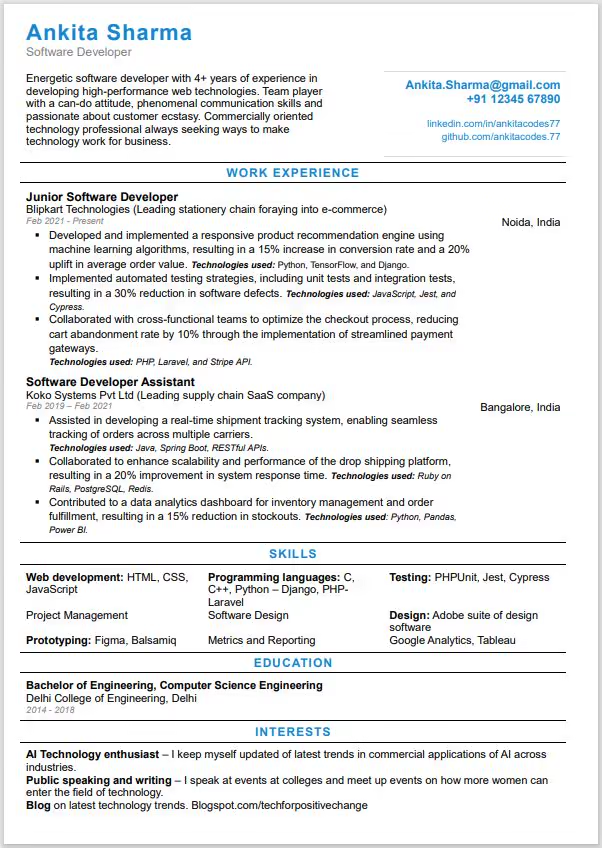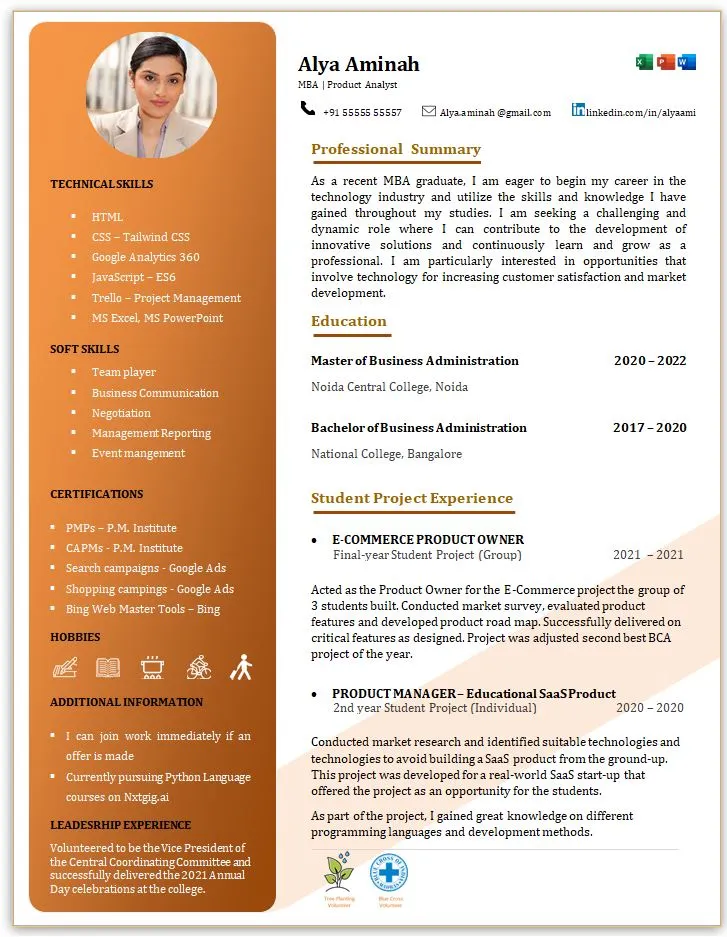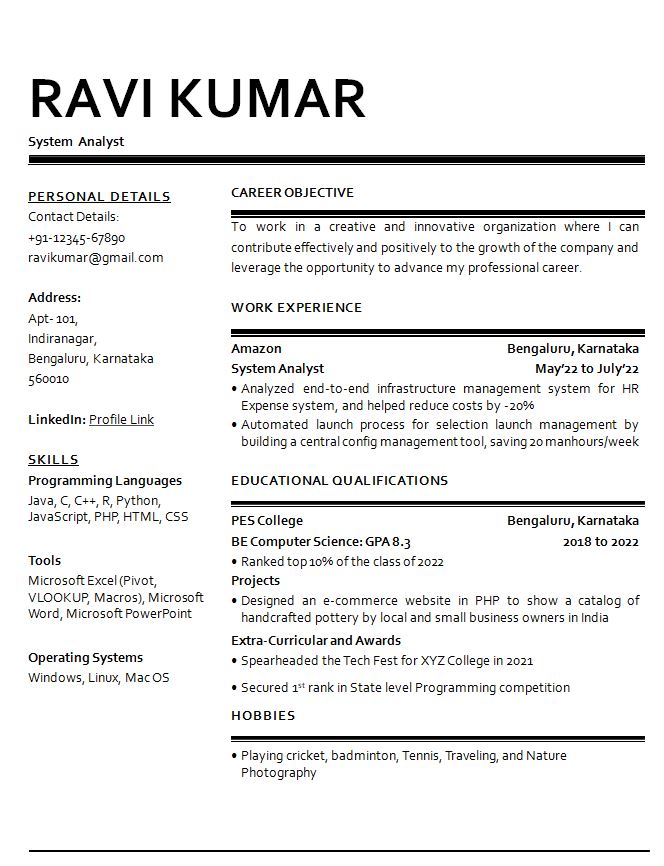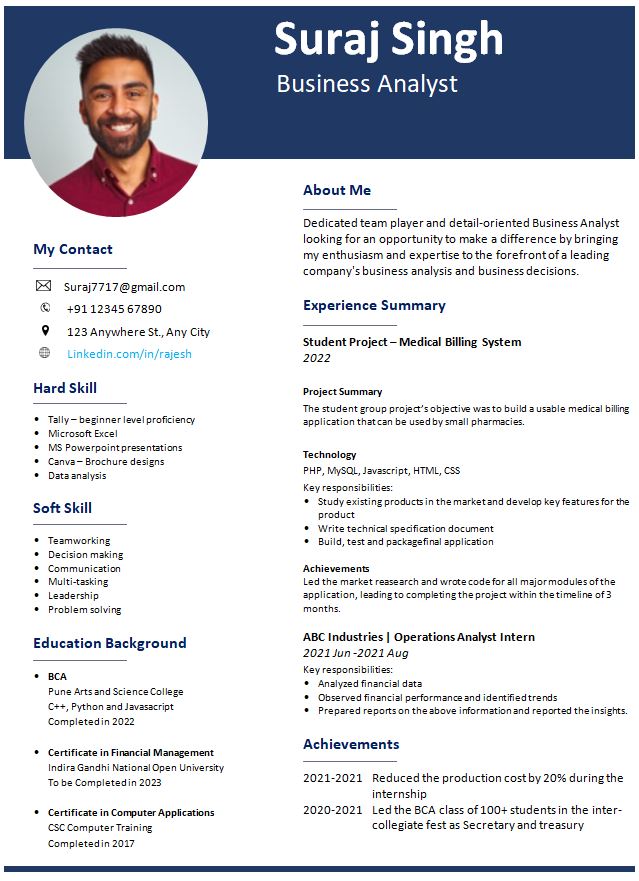Classic Resume
BE Computer Science Sample Resume
Software Developer
SoftD

Objective
Energetic software developer with 4+ years of experience in developing high-performance web technologies. Team player with a can-do attitude, phenomenal communication skills and passionate about customer ecstasy. Commercially oriented technology professional always seeking ways to make technology work for business.
Education
BE Computer Science, ME Computer Science, MCA Master of Computer Applications, BCA Bachelor of Computer Applications
Skills
We have hand-picked these skills based on our review of most sought-after skills on job descriptions for software developers.
Web Development:
HTML, CSS, JavaScript: These are the fundamental technologies of web development. HTML is used for structuring web content, CSS for styling, and JavaScript for adding interactivity and dynamic behavior. Proficiency in these languages showcases your ability to create responsive and visually appealing web applications.
Programming Languages: C, C++, Python - Django, PHP - Laravel:
Programming languages are the building blocks of software development. C and C++ demonstrate low-level programming expertise, often used in system and game development. Python with Django is important for web application development, particularly in creating scalable and maintainable web applications. PHP with Laravel is a popular combination for building dynamic and efficient web applications.
Testing: PHPUnit, Jest, Cypress:
Testing is a critical aspect of software development to ensure quality and functionality. PHPUnit is used for testing PHP code, Jest is a testing framework for JavaScript, and Cypress is for end-to-end testing. Proficiency in testing tools demonstrates your commitment to producing bug-free and robust software.
Project Management:
Project management skills show that you can oversee and deliver projects effectively. This skill includes planning, resource allocation, time management, and communication with team members and stakeholders.
Software Design:
Software design encompasses creating the architecture and structure of software systems. It involves decisions about components, modules, and their interactions. Demonstrating software design skills indicates your ability to create scalable, maintainable, and efficient applications.
Design:
Adobe Suite of Design Software: Design skills are important for creating visually appealing user interfaces and user experiences. Proficiency in Adobe design tools like Photoshop, Illustrator, or XD showcases your ability to create aesthetically pleasing designs.
Prototyping:
Figma, Balsamiq: Prototyping tools help visualize and demonstrate the user interface before actual development. Figma and Balsamiq allow you to create interactive mockups, which aids in design validation and user feedback.
Metrics and Reporting:
Google Analytics, Tableau: Understanding metrics and reporting tools is crucial for tracking user behavior and application performance. Google Analytics provides insights into user engagement, and Tableau helps create data visualizations for informed decision-making.
Including these skills on your resume paints a comprehensive picture of your capabilities as a software developer. It shows that you're not only proficient in coding but also skilled in design, testing, project management, and data analysis – essential qualities for a well-rounded software developer.
Projects
If you are a recent graduate and exploring a career as a software developer but haven't had any internship opportunity, do not be discouraged. With the help of ample opportunities available online, you can easily pursue one or two projects to demonstrate your technical capabilities.
Here are two project ideas.
Project 1. E-Commerce Website:
Objective:
Develop a web-based e-commerce platform where users can browse products, add them to their cart, proceed to checkout, and make payments. Admins should be able to manage products, orders, and user accounts.
What you should aim to achieve as results:
1. Gain experience in full-stack development, combining front-end (HTML, CSS, JavaScript) and back-end (Java, Python, PHP) technologies.
2. Learn about user authentication, database management, and payment integration.
Showcase your ability to design an intuitive user interface and implement secure user interactions.
Highlight your proficiency in working with frameworks like Django, Spring Boot, or Laravel.
Demonstrate problem-solving skills when addressing challenges related to inventory management, order processing, and security.
Project 2. Mobile App for Task Management:
Objective:
Develop a mobile app that allows users to create, edit, and manage tasks and to-do lists. Implement features like task prioritization, due dates, and reminders.
What you should aim to achieve as results:
1. Learn mobile app development using platforms like Android (Java/Kotlin) or iOS (Swift).
2. Showcase your skills in designing a user-friendly interface for a mobile application.
3. Implement functionality like data storage (local or cloud-based), task synchronization, and notifications.
4. Demonstrate your understanding of mobile design principles, such as responsiveness and touch interactions.
5. Highlight your proficiency in integrating mobile-specific features like camera access or location services.
Both of these projects provide hands-on experience with technologies and concepts commonly used in the software development industry. They showcase your ability to design, implement, and deliver practical solutions – skills that are highly desirable for software developer roles. Additionally, these projects can be presented in your portfolio, making you a stronger candidate when applying for jobs.
Good luck with these projects.
Interests/Hobbies
If you choose to include interests and hobbies on your resume, it is important that you are strategic about which ones you want to list on your resume. Pick the ones that are appropriate and highlight your passion for your field of work.
AI Technology Enthusiast:
Demonstrates your passion for staying informed about emerging technologies, especially AI. Indicates your interest in advancements that could impact software development in the future. Illustrates your commitment to continuous learning, a highly valued trait in the tech industry. Shows that you are forward-thinking and can bring innovative perspectives to projects.
Public Speaking and Writing:
Public speaking showcases your ability to communicate technical concepts effectively to different audiences. Highlights your confidence and presentation skills, which are essential for explaining complex ideas to non-technical stakeholders. Speaking at events on encouraging women in technology emphasizes your commitment to diversity and inclusion. Writing skills are important for creating documentation, technical guides, and communicating within development teams.
Blogging on Latest Technology Trends:
Blogging exhibits your expertise and thought leadership in technology. It shows your ability to analyze trends critically and articulate your insights to a wider audience. Demonstrates your commitment to sharing knowledge and contributing positively to the tech community. Provides a tangible online portfolio of your thoughts, which can be valuable for potential employers to assess your expertise.
Overall, these skills go beyond technical prowess and highlight your broader engagement with the tech community, your communication abilities, and your commitment to personal and professional growth. They make you a more well-rounded candidate, showcasing your potential to contribute not only to development tasks but also to knowledge sharing, team collaboration, and industry advancement. Please consider including these on your resume for software developer jobs.
Experience
Junior Software Developer
Blipkart Technologies (Leading stationery chain foraying into e-commerce)
Feb 2021 - Present Noida, India
1. Developed and implemented a responsive product recommendation engine using machine learning algorithms, resulting in a 15% increase in conversion rate and a 20% uplift in average order value. Technologies used: Python, TensorFlow, and Django.
2. Implemented automated testing strategies, including unit tests and integration tests, resulting in a 30% reduction in software defects. Technologies used: JavaScript, Jest, and Cypress.
3. Collaborated with cross-functional teams to optimize the checkout process, reducing cart abandonment rate by 10% through the implementation of streamlined payment gateways.
Technologies used: PHP, Laravel, and Stripe API.
Software Developer Assistant
Koko Systems Pvt Ltd (Leading supply chain SaaS company)
Feb 2019 – Feb 2021 Bangalore, India
1. Assisted in developing a real-time shipment tracking system, enabling seamless tracking of orders across multiple carriers.
Technologies used: Java, Spring Boot, RESTful APIs.
2. Collaborated to enhance scalability and performance of the drop shipping platform, resulting in a 20% improvement in system response time. Technologies used: Ruby on Rails, PostgreSQL, Redis.
3. Contributed to a data analytics dashboard for inventory management and order fulfillment, resulting in a 15% reduction in stockouts. Technologies used: Python, Pandas, Power BI.
Additional Inputs
There are numerous free online resources available for aspiring software developers to enhance their skills and knowledge. Here are some categories and examples of free resources you can make use of:
Online Learning Platforms:
Coursera:
Offers a wide range of free courses from top universities and institutions.
edX:
Provides free online courses from universities worldwide, covering various programming languages and software development topics.
Khan Academy:
Offers interactive programming courses and tutorials for beginners.
Coding Practice and Challenges:
LeetCode:
Platform for practicing coding problems and preparing for technical interviews.
HackerRank:
Provides coding challenges in various domains and languages.
Codecademy:
Offers interactive coding exercises and projects to learn and practice programming.
Documentation and Guides:
Mozilla Developer Network (MDN):
Comprehensive documentation and tutorials for web development technologies.
DevDocs:
Aggregates documentation for a wide range of programming languages, frameworks, and libraries.
Version Control and Collaboration:
GitHub:
Platform for hosting and collaborating on code repositories. It's also a valuable resource for finding open-source projects to contribute to.
GitLab:
Offers free Git repository hosting and collaboration features similar to GitHub.
Online Communities and Forums:
Stack Overflow:
Q&A platform where developers can ask and answer programming-related questions.
Reddit:
Various subreddits like r/learnprogramming and r/webdev provide discussions, resources, and support for beginners.
Tutorials and Blogs:
Medium:
Offers a wide range of technology-related articles and tutorials written by professionals and enthusiasts.
FreeCodeCamp:
Provides interactive coding tutorials and projects, along with a supportive community.
Video Platforms:
YouTube:
A wealth of coding tutorials, walkthroughs, and explanations on various programming topics.
The Net Ninja:
YouTube channel with comprehensive tutorials on web development, frameworks, and languages.
Podcasts:
CodeNewbie:
A podcast that covers the journey of beginner developers.
Software Engineering Daily: Provides interviews and discussions on software development topics.
IDEs and Tools:
Visual Studio Code:
A popular, free code editor with extensive extensions for various programming languages and frameworks.
Eclipse:
An integrated development environment for Java and other programming languages.
Remember that while these resources are free, they may also offer paid courses or premium features. When exploring, focus on the specific skills you want to develop and use a mix of resources to get a well-rounded learning experience.
Good luck with your ambition to becoming a software developer.
Why this template works
This is a simple resume template and simple resume templates work best for technical roles for a few key reasons:
Clarity: Technical roles demand clear communication. A simple template emphasizes your skills, experience, and accomplishments without distracting design elements, ensuring that your qualifications are easily accessible.
Focus on Content: In technical functions, the content of your resume matters most. A simple format directs the hiring manager's attention to your expertise, projects, and technical accomplishments rather than elaborate visuals.
Scannability: Recruiters often skim resumes. Simplicity aids quick scanning, making it easier for them to identify relevant technical skills and experiences.
Professionalism: A clean and straightforward design conveys professionalism. In technical roles, professionalism is crucial, and an overly complex template can be perceived as unnecessary.
Compatibility: Simple templates are more likely to render well across different devices and software platforms, ensuring your resume is accessible to all hiring managers.
Adaptability: A simple template can be easily tailored to match specific job descriptions, enabling you to highlight the technical skills and experiences that align with each position.


